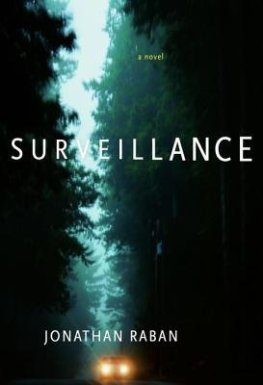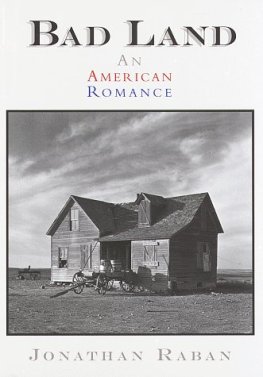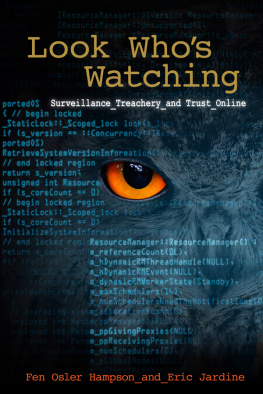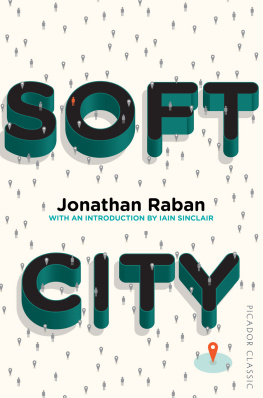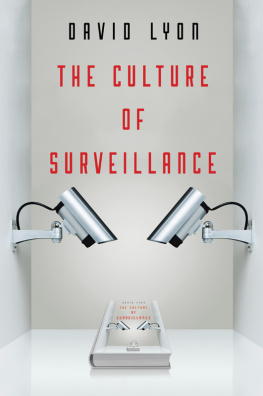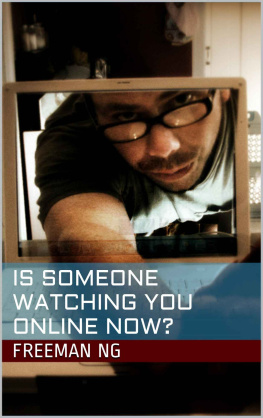Jonathan Raban
Surveillance: A Novel
In order that self-surveillance be fully assured, it must somehow be itself held under surveillance. Thus, there come into existence forms of surveillance of surveillance to which, for the sake of brevity, we shall give the exponential notation (surveillance)2. We shall, moreover, set out the elements of a surveillance of surveillance of surveillance, in other words, of (surveillance)3.
Gaston Bachelard, Applied Rationalism (translated by Mary McAllester Jones)
AFTER THE EXPLOSION, the driver of the overturned school bus stood beside the wreckage, his clothes in shreds. He was cupping his hands to his ears, as if to spare himself the noise of sirens, car alarms, bullhorns, whistles, and tumbling masonry. When he brought his hands away and held them in front of his face, both palms were dripping blood. His mouth opened wide in a scream that was lost in the surrounding din.
Beyond the bus, a tire dump had caught fire. Swirls and billows of black smoke, looking as thick and glossy as oil in the early morning sunshine, rose in a fast-climbing plume above the flames. The painted letters of the company sign, PACIFIC AUTO RECYCLING, swelled and popped in the heat.
A child was scrambling from a blown-out window on the bus a towheaded boy of nine or ten, his face framing a disheveled grin. Half in, half out of the bus, he sat on the windows edge, gazing at the lurid inferno of burning tires and the screaming driver as if the catastrophic nature of the occasion quite eluded him.
Rescue workers came running sexless toddlers in silver spacesuits their giant feet slipping and sliding on the pulverized glass that coated the road inches deep like a freak hail-fall. Shards of glass were still dropping from the windows of buildings that had taken the full force of the blast.
The hollow whoomph of an exploding gas tank came from inside the auto-wrecking yard, followed by another a couple of seconds later. A spaceman with a machine gun shouted, Keep down! Keep down! at the rescue team, his voice muffled and distorted as he yelled through his respirator into a bullhorn. Bent low, stumbling through glass, they reached the bus, from which silvery tendrils of smoke or steam were now drifting skyward.
Get in there! Get every live kid out of it, now!
Silver-suited fatties clambered onto the axle casing, hoisted themselves atop the side of the yellow bus, and dropped inside through the windows. Two pairs of rescuers half carried, half hustled the grinning boy and the driver along the road, splashing through a small turbulent river that issued from a ruptured water main. The drivers head flopped against his chest, blood from his ears spattering what was left of his shirtfront.
A body in a torn tracksuit lay on its back in the path of the rescue party, her mouth and eyes open as if shed been saying something important when sudden death interrupted. Dust, fine and pale as talcum powder, was settling on her face, as it settled on the parked cars and curbside dandelions, graying everything on which it fell.
The ground quaked to the sound of a bigger whoomph from the wrecking yard. The bus drivers head jerked upright from between the shoulders of his rescuers, and he let out a throaty, gargling howl. Oh my Christ! The word Christ was drawn out over several seconds, mingling in the air with the echoing rumble of the latest explosion.
Not there! There! Get them on the Decon van! The Red Cross van, assholes. Move it! I said move it!
Go fuck yourself, said one of the rescuers from inside his hazmat hood, his voice audible only to the bus driver and, by a stretch, to his fellow rescuer. Fucking National fucking Guard.
The stumbling trio broke into an ungainly trot, closely followed by the rescuers with the boy, like competitors in a three-legged race making the final dash for the tape.

THE TARRY CHEMICAL stink of the fire filled the Red Cross van taking them to the Decon tent at Harborview. The rear windows looked out on boiling flames and on the dense black overcast, rifted here and there by scraps of flawless blue, that now darkened the streets. In the foreground, a camo Humvee, spacemen with gurneys, running stick figures, splayed bodies, liberated papers seesawing in air, drifts of toxic dust, smoking heaps of bricks and torn Sheetrock.
The driver of the school bus, Tad, was trying to assign the name of a painter to the scene. Goya, maybe. Or Hieronymus Bosch. He tipped his head and jiggled his pinkie in his right ear to clear the canal of stage blood.
Howre you doing, kid?
Good.
Better than school, huh?
The boys nose was squashed against the glass. The transfixed grin hadnt left his face since the moment when hed first climbed out of the bus.
You wait, Tad said. You wait till you go through Decon. Thats something else.
In Decon the boy would be stripped naked and hosed down before being admitted to the hospital. Tad had gone through it a couple of exercises ago. Never again: hed written that into his contract. Today, as soon as the van reached Harborview, hed be into his next part. After Bus Driver with Burst Eardrums came Psychotic Homeless Man Disrupting Work of Rescue Team, then Dying Amputee, Man Having Coronary, and the one he seriously dreaded Man Being Dug from Rubble.
Tad Zachary was one of the six professional stars of the show titled TOPOFF 27 by the Department of Homeland Security. Most victims were played by volunteers from government offices and by homeless people getting minimum wage and a free lunch. Tad and his fellow actors were scoring $1,000 of federal money apiece for their days work. They were the ones whod be filmed in close-up, their images beamed by satellite to the bunker in D.C. where the exercise was being monitored.
He needed the job. His last appearance on stage had been sixteen months ago, when hed played Willy Loman in the ACTrevival of Death of a Salesman. Since the downturn in the economy, one Seattle theater after another had gone dark, and Tad was scraping by on residuals, commercials, voiceovers, PSAs, vilely written parts in spec indie movies at $250 a throw, management-and-training films, the rare gig as MC at a corporate junket, and the interest on the proceeds of the sale of his mothers house in Portland. He had to remind himself most days that he was lucky: he had a strong local name and good connections. Even jobs in retail, the usual standby of the out-of-work actor, were in short supply now. His friend Gilda Hahn, whod played opposite him as Linda Loman, had been on food stamps before she found her current role, working the midnight shift at a 7-Eleven on Denny Way.
For Tad the TOPOFFs were performances, but for the emergency services they were dress rehearsals: FEMA, the National Guard, the firefighters, police, ambulancemen, and civic officials were still plotting out their lines and moves, and still not getting it right. In TOPOFF 26, nearly every rescue worker had been contaminated, fatalities had vastly exceeded predictions, chains of command had broken down, hospitals overwhelmed. The reviews that came down from D.C. were so terrible, Tad had heard, that they were officially classified and never reached the press.
This one was the most realistic yet. A dirty bomb (two thousand pounds of ammonium sulfate, nitrate, and fuel oil, mixed up with fifty pounds of cesium-137 in powdered form) had gone off in a container supposedly holding cotton apparel from Indonesia, recently unloaded from a ship docked at Harbor Island. A fireworks expert (the same guy who directed the July Fourth display on Elliott Bay) created the terrific gunpowder explosion and the rockets laden with talc to simulate cesium. The tire fire had been set with gasoline, the broken glass supplied by volunteers standing on the roofs of neighboring buildings. At least the pictures beamed to the other Washington would look great.

